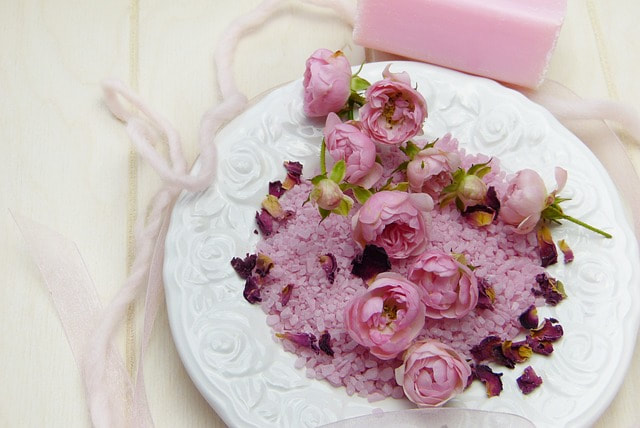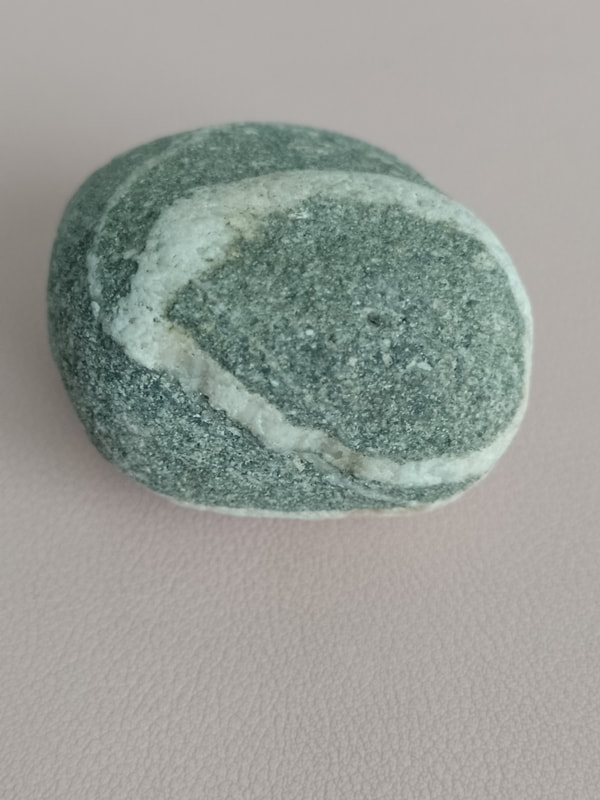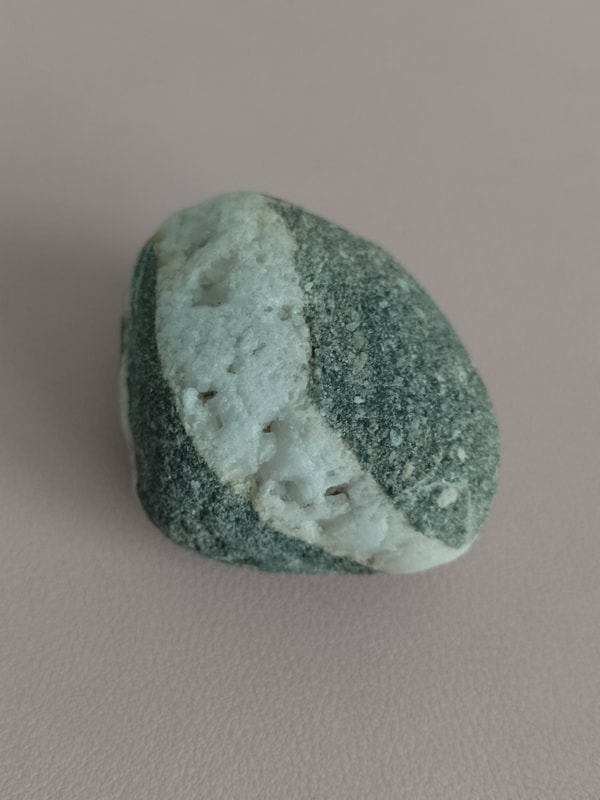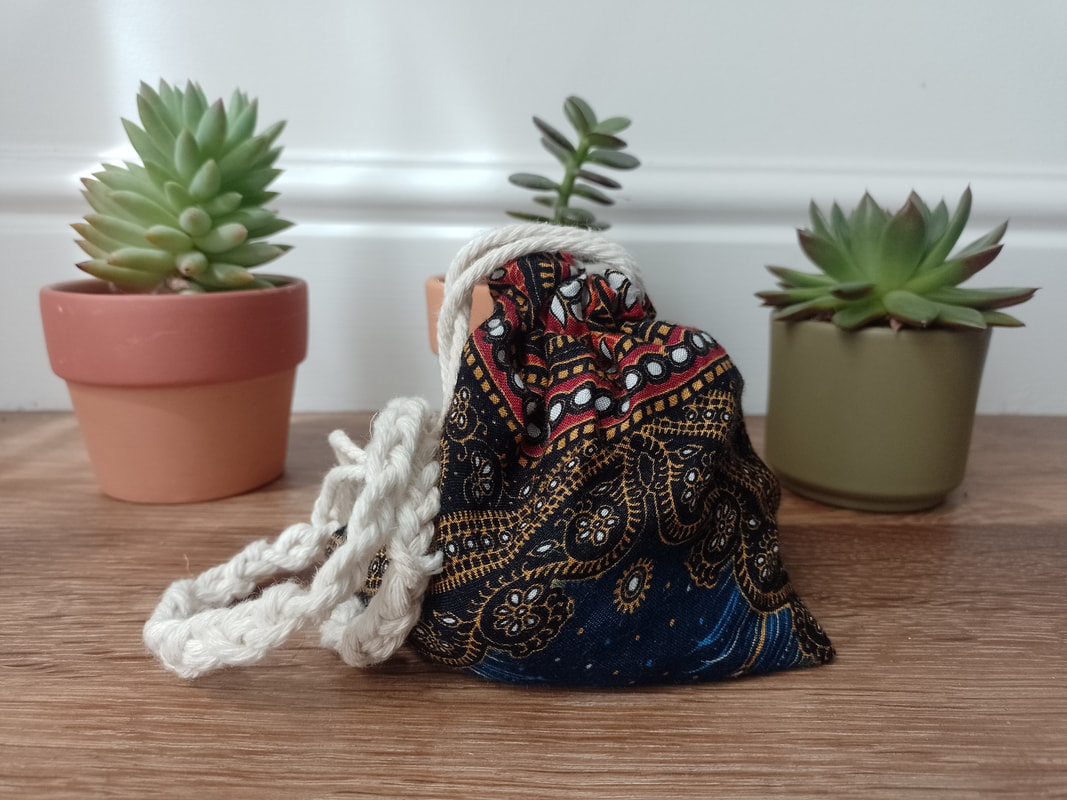|
I am very fortunate to be in a position where my home is genuinely my sanctuary. I live alone, so have free rein over all decorating decisions (which is a first!), it's small, but it's cosy, and provides me with all of the amenities I need. Plus it is right next to a river, which is perfect for the likes of me given my interest in the element of water. I love my little flat, and see it as my temple, a reflection of myself and my spirituality. Or, at least, that's what I aim for - I still have a lot of decorating to do!
Which means I take particularly good care of it - again, a first for me. I've always been a bit messy, always had something better to do than clean, and had no problem letting boxes and general 'stuff' live in piles by doors, drawers, etc. However, finally having a space which is completely my own, and one which I want to reflect the spiritual way in which I try to live my life, has been a game changer. I dust, I clean, and clothes actually go in drawers rather than in a pile at the end of the bed(!). As well as the physical aspect of maintaining this space, I also enjoy cleansing it regularly and 'spiritually' cleaning it. This involves cleansing it, protecting it, and blessing it. There are many different ways you can do this; however, I prefer an approach which focuses on all three aspects (cleansing, protection, and blessing) separately, and tying all of these together. In a pinch, I will just perform a smoke cleanse, but where possible I aim for this three-pronged approach. It's quick, it's effective, and it is incredibly easy! You will need minimal tools for this little ritual. And whilst I have called it a 'ritual', I don't mean ritual in the formal sense; you don't need to cast a circle, call quarters, etc. Just grab the items below, and you're ready to get going! To perform this little ritual, you will need: - Incense - A bowl of salt water - A small bell or similar (I use a Tibetan Singing bowl) First, we will cleanse the space, and here we use the incense. Incense smoke is used in many different cultures and traditions to cleanse a space, or a person, of negative energies. Simply light your incense, and walk clockwise around your space wafting the incense smoke as you go and repeat the following chant: "I cleanse this space of all negativity, in this world and in the astral. I cleanse this space of all negativity, in this word and in the astral. May all negative energies be banished from this place, May only love and light be permitted to enter this space." Once you have completed a full loop of your space, we will move onto protection. For this, you will repeat as we did above, but with the bowl of salt water. Salt is a well known protector, so sprinkle the salt water upon the floor as you again walk in a clockwise direction around your space whilst repeating the following chant: "I protect this space from all negativity, in this world and in the astral. I protect this space from all negativity, in this world and in the astral. May all negative energies be barred from this place. May only love and light be permitted to enter this space." Once this in complete, we will move onto blessing, and this is where we will use our bell or sound bowl. Sound, especially from these sorts of tools, are often used to invite energies in. In this instance, we want to invite positive energies in. So, for the final time, walk clockwise around your space whilst ringing/dinging your chosen tool, whilst repeating the following chant: "May this space be blessed with positive energies. With love, and light, and goodness." Finally, once you have completed this step, say a little prayer or closing chant. I will usually say something to the effect of: "May this space be cleansed, protected, and blessed, in the name of the great Goddess, the mighty God, the Universal Energy, and the element of Water who guides and nourishes me. May it be a sanctuary, a place of spiritual retreat. So mote it be." And that's it! Again, it's quick (depending on how big your space is; I am often glad mine is a one bed rather than a seven bed mansion!), and extremely effective. So give it a go and see how it resonates with you!
0 Comments
I love looking into local history, and thought it was about time I gave London its due attention as I haven't really done much research since I moved back here! And so I came across Mother Redcap - one of London's most famous witches. She was said to live in a tavern called 'Mother Redcaps Tavern' which was located near what is now Camden Lock, in Camden. The pub still stands, and is now better known as 'The World's End' (a pub I have drunk in many times, before I moved to London, and never realised the history behind it!), a popular venue near Camden tube station. Her real name was Jenny/Jennie, or Jinny Bingham, and she lived in Camden during the 17th Century (it is estimated she was born during the reign of King James I, so between 1603 and 1625). Back then, Camden was a very different place than what it is today; today you can struggle to get from one end of the high street to the other thanks to the dense crowds of people enjoying the large number of shops, market stalls, and venues the place has to offer. However, back in the 17th century Camden was primarily a rural area, surrounded by fields, meadows, and orchards, populated by farmers and wealthy landowners. It was here that Jenny lived, and despite her reputation, somehow managed to avoid being arrested and tried as a witch which is very surprising considering the beliefs of the time. Jenny wasn't exactly subtle about her beliefs and practices either. It is said that she wore a cloak which she sewed bats onto, had a black cat that would follow her around, constantly smoked, and would happily yell abuse at anyone who would question her ways. She was also reported to be incredibly ugly, with a “hideous head, wrinkled and sallow, shaggy of brow, sunken and bleared of eye, hug of nose, wide of mouth, and sullen of look” (Doubleyew 1879: 514)." She also began to wear a red cap, hence the name. Her reputation was well-known as she was never short of customers looking for tinctures and potions (and it was said that she was particularly knowledgeable in poisons), and divinations into the future, as well as curses and hexes. Whilst people at the time were suspecting, paranoid, and fearful of witches and the death and destruction their devilry could cause, a good many of them still sought out cunning folk for their own purposes.
Her love life is also a rollercoaster of death and intrigue. Her first husband, Gipsy George, was hung for steeling sheep. Her next boyfriend, a man called Darby who was known to be a violent alcoholic disappeared without a trace, and her boyfriend after that - a man named Pitcher - also disappeared. He was eventually found dead in Mother Redcap's oven. Yes, you read that correctly - in her oven. The defence was aided by a witness who testified that Pitcher used to hide from Mother Redcap in the oven, and one day he must have hid from her in there and fallen asleep as Mother Redcap started cooking and baking. Surprisingly, the jury was convinced and acquitted her. At around the time Darby disappeared, Jenny's own parents were hanged on charges of witchcraft after they were accused of using black magic to kill a girl. Whilst she may have been acquitted of the murder, this and her parents own hanging, did not do her reputation any good and her business declined. She eventually found another possible suitor, seemingly by chance; a man who was in need of shelter offered her money to stay at hers in an effort to lose his attackers. It worked, and he continued to live with her even after, but when he too died rumours circulated that she had poisoned him, which didn't help matters. Mother Redcap went from being one of the most sought after cunning folk to becoming a recluse and a pariah; whereas people seemed to turn a blind eye in the past, now whenever some sort of misfortune afflicted the small town the townsfolk would gather in front of her home and directly accuse her. However, she was still never arrested nor tried as a witch. Accounts of her death seem to differ; some believe that she died in her kitchen and was found by a neighbour, and that the devil himself came to Camden to collect her soul. Another source states that she and her then husband were accused of witchcraft after the death of a woman, and for the last time, for they were both hanged at Tyburn (perhaps there is some confusion here with the hanging of her parents?). History seems to be determined to paint Mother Redcap as the stereotypical, old hag, the evil crone who murders and poisons those around her. However, we are all aware of the treatment of cunning folk during this time, and I'm sure there is probably more to the story of Mother Redcap than history would allow us to know! In a world filled with energies both seen and unseen, it is essential to safeguard our mental, emotional, and spiritual well-being. One of the most common methods of doing this is known as shielding, where we manipulate energy to create a 'bubble' or barrier around us to keep negative energies out. These energies can come from a myriad of different sources; the environment, other people talking negatively to us or about us, those who may unconsciously direct negativity our way through jealousy or envious thoughts, and so on. Shielding can be extremely effective; however, in my experience, sometimes even that bubble isn't enough to protect us. So, what works better than one shield? Yep - two shields! A few months ago I had an experience in which I was at work, at my laptop focusing on my own work, with a group of people stood next to me discussing their own work. They clearly weren't having a good time, and the negativity they felt in that moment was palpable. One person can be bad enough, but five people radiating that sort of negativity was difficult to ignore. I took a few moments to focus on my shielding and strengthen my bubble, but it still wasn't enough. So I employed the double-layering technique and was surprised at how much of a difference it made! Double layering my shield is now my go-to technique when I am faced with extreme negativity, and with the single layer, it can be called upon relatively quickly with a bit of practice as and when you need that extra protection. To create your double layered shield, you basically create one layer, but twice. So first let's take a look at creating that single layer, and then how to duplicate that to add our second layer. To start, you need to draw the energy towards you which you will then shape into your shield. I've read plenty of guidance which states you should focus on your own energy and then push that outwards to create your shield. I very much advise against using your own energy for this, especially as a shield needs to be maintained; if you are using your own energy to create and maintain it, you will just deplete your own energy stores which can leave you feeling fatigued, low on energy, and perhaps even experience physical symptoms such as headaches. So I always recommend using external energy. To do this, begin with the classic 'roots and antlers' meditation. Visualise 'roots' stretching out from your feet or your root chakra, down into the earth, and anchoring you to it. Then visualise 'antlers' growing from your head, reaching up into the sky and anchoring you to the skies; as the saying goes, 'as above, so below'. Usually when performing this exercise the instruction is to connect yourself to the earth and the air; however, as a water witch, I prefer to connect with the waters that flow beneath the earths surface with my roots, and the moisture in the air and the clouds with my antlers. However, this is a personal preference, and you should go with whichever gives you the stronger connection. Once you have done this, you will want to focus on your breathing; as you inhale, you want to visualise pulling energy up from your roots, and down through your antlers. As you exhale, you want to direct this energy to form a bubble around you. Again, this can take practice, but it is well worth sticking with it! Inhale the energy, and exhale it into your initial bubble. In fact, once you have mastered this, you can 'feel' the energy constantly flowing up/down and into your shield without your breath. This bubble can take any form you want; you may see it as a coloured light, you may see it flowing smoothly or 'crackling' like electricity. Again, as a water witch, I visualise my shield as waves which move around me. This movement is very important as it will help in maintaining its energy; no matter how you visualise your shield, see this energy constantly moving, spinning around you in a clockwise direction.
This is how we create our first layer. To create your second layer, we are going to do the same, but we want to reach out separate roots/antlers to do so. This can be tricky as now we are managing four streams of energy flow which is again why it may take some practice. However, again, it is well worth the practice! See this energy forming a second shield outside of your first shield, encasing both you and your original layer. Build it in exactly the same way; inhale the energy in, exhale it into your layer, and when you feel happy, focus on seeing the energy flowing through into your shield constantly, without the need for your breath. However, whereas our first layer flows around us in a clockwise direction, we want this shield to flow around us in an anti-clockwise direction. I have personally found that this approach, the layers moving in opposite directions, adds power to the shields and again aids in maintaining the energy even when you are not consciously focused on it. Sit with this for as long as you want, and when you feel ready (or like me, need to actually get back to work and start answering emails), 'cut off' the energy streams and see your shields moving around you, sustained by the kinetic energy of their own movement. And that's it! As I've said a couple of times, it does take practice as it is a bit more complex than creating the standard single layered shield, but I personally find it extremely effective when faced with a large amount of negative energy and one which I would highly recommend anyone who has an interest in energy protection learning. 19/11/2023 0 Comments Witchfest 2023This year I was extremely lucky to be invited to talk at Witchfest International 2023. Witchfest is run by the Children of Artemis and has been going for years - I remember going to my first Witchfest back when I was at University over fifteen years ago! So I was extremely excited to be able to attend as a speaker.
Witchfest was held in Croydon which is convenient for me as a Londoner, and my journey to the venue was nice and easy. However, I was not prepared for the protesters outside! A large group of people had gathered outside, singing, chanting, holding signs about how we need to accept Jesus and trying to hand out leaflets. I have to admit, this is the first witchcraft orientated event I've been to that's been protested against! We even had the police in attendance at some points, and boy these protesters were not letting up! If anything, they got even louder as the day went on and were still present well into the evening celebrations. Luckily they did not seem to sway anyone and didn't prevent us from having a great Witchfest! Walking into Witchfest kind of feels like coming home. The people and their dress is free and expressive - it very much made me feel underdressed in my jeans and hoodie! Unfortunately I haven't had any hot water for over a week and have been having to shower at the gym which has been massively inconvenient (my hair definitely looked as though I had been plugged into an electric outlet rather than its usual waves!). So next year I will definitely be making more of an effort on the dress front! And don't even get my started on the stalls; the minute I walked into the main stall hall my debit card practically fell out of my pocket and into the hand of the stall holders. It was incredible to see the care and attention which had gone into handcrafting a lot of the items, and with so much variety and choice it was difficult not to walk away with a bag full of goodies and a hole in the bank account. From wands, to jewellery, head dresses, books, crystals, crystal grids, pendulum boards, soaps, incense....a shopaholic witches dream! The range of talks meant there was something for everyone; from chaos magick to hedgecraft, heathenry, crystals, and more, it was impossible not to find a speaker that would appeal to your particular path. Huge props to the speakers who had to deal with the noise from the protesters spilling into a couple of the conference rooms; it couldn't have been easy but most managed to make a joke out of it and still hold the audiences attention. And it wasn't just talks, but performances and practical workshops thrown in too. It's difficult to pick a highlight; I have to say though, the Pentacle Drummers performance in the Ashcroft Playhouse was incredible to watch. To be honest, with so many fantastic talks on I was very nervous that no-one would turn up to mine! I actually couldn't believe the number of people who turned up. And I'll be honest - it wasn't the best conference talk I have ever done. When I chose the subject (using the cups tarot suit in your magickal practice) I was working heavily with the cups suit and thought if anything I would struggle to keep the talk short! Unfortunately it was actually quite difficult to speak at length on. I know I'm not the most confident or engaging speaker, so I always try and make sure my talks are more 'practical', giving people activities they can go away and try themselves to make up for it, and whilst working with the cups suit in your magickal practice can bring many benefits, it's difficult to talk at length about how you do it - the doing is most definitely more in-depth than the talking about it! Plus there was a lot of reading from my notes, as what with everything going on with the boiler and having to arrange trades people to come out, and this also being my last week in my current job and so having a lot to wrap up, I just didn't have the time to practice it as much as I usually would. So, to anyone who did attend my talk, I'm sorry!! I am usually a much better speaker than that!! But despite all of that I really enjoyed doing the talk, and again and so grateful to everyone who did turn up to listen. I do sometimes feel a bit burnt out what with promoting the books, the website, recording the short courses, etc., on top of my fulltime job and general life, but its events like Witchfest that remind me why I love doing what I do. After the talks came to an end, there was the music! I saw some great bands (over a couple of pints) including Green Diesel, and of course the legendary Damh the Bard, which I will definitely be keeping an eye on to see if they are ever playing around London; people were up and dancing, and everyone was in high spirits. It was a great end to what had been a great day, and really encapsulates the best bits about the community; the supportive nature of everyone there, the enthusiasm, the kind-heartedness, and the creativity. I am already looking forward to spending the day at Witchfest 2024, even if that is just as an attendee! I highly recommend Witchfest International to anyone who is even remotely interested in witchcraft, as in my eyes it truly encapsulates the best of our pagan community. We are all aware of the dangers of the internet. However, there are some specific 'dangers' - or at least scams - that seem to be specific to the witchcraft community. One of the most repreatedly posted questions I see online goes something along the lines of 'I visited a psychic and they told me there is a generational curse and now she can remove it for me (usually costing money), is this real'? The short answer is, most likely not. And there are a lot of these scams going around. So today, I wanted to give some tips on staying safe online so you don't find yourself in danger or out of pocket. We will start with the obvious: never give out your personal details to people you don't know. Definitely not your address, and absolutely not your bank details! Now, phone number is always a bit of an iffy one; I have given out my phone number exactly three times to people in the community I hadn't actually 'met' yet. Two were ladies I was involved in running a small community with and had messaged extensively online first, and the other was a lady who I was arranging to meet at a conference I was speaking at because she was helping organise the conference. The great thing about phone numbers is you can block them if things get weird or even change your number (as much hassle as that is). On the whole, this is a lovely community, and you will make friends online that you may want to chat to outside of online spaces. Trust your gut if you are going to give your phone number out to people and don't be afraid to bail the minute it gets uncomfortable. Now that is out of the way, let's move on to more 'witchy' scams: 1. People messaging you asking if they can do a reading for you: There is a difference between marketing and people soliciting you for readings. Marketing is more general, more impersonal, and is usually just a 'call to action'; asking you to check out their shop, advertising they are doing readings and to let them know if you want one, etc. Those soliciting you for readings will be much more personal, often opening with something along the lines of 'hey! I saw your profile and I just felt such an energy coming from you, I just knew that I was meant to connect with you!', or 'my guides led me to your profile as they have a message for you'. I get a lot of these, and one evening after a few drinks (and having some spare money having done really well saving that month), I decided to play along and see how legit it was. So I responded to one of these messages, and they offered to do a reading for me (which cost £40!), to reveal my message. So I agreed. They messaged me back literally three minutes after I had transferred the money via PayPal saying they had pulled three cards and had my message. Now, I'm sorry, I don't care how good a Tarot reader you are, there is no way you can connect with your guides, shuffle your cards, pull three, interpret them, and write a message with that interpretation in three minutes. Absolutely impossible. Strike one. And - Gasp! - wouldn't you know it! Apparently I have a family member who was jealous of my potential success so put a curse on me when I was a child! This was strike two. I have a damn good life. I have good friends, partner, family, a well paying job I enjoy, I own my own flat in a city I love, I am getting to do what I love with my books, podcast talks, etc. If this is me being cursed, then all I can think is that this 'curse' has someone prevented me from being the billionaire play-girl married to the hottest Hollywood actor that I always knew I should have been if life hadn't of dealt me this cruel hand! But I went along with it, and then would you believe it - she had just the curse removal spell she was willing to cast for me! So generous, so kind....wait no, just kidding, of course that too would cost me. Strike three. By that point I had had my fun and proved my point, so just ignored them. But many well respected tarot readers and practitioners of any magickal art will tell you that they do not solicit their works. So if someone you have never heard of creeps into your DM's with a message from their spirit guides, chances are, it's a scam. 2. Paying for Spells: Another popular one. 'I can make your ex come back to you, I can curse his new lover', etc. You see them everywhere; on social media, on Etsy, one self-built websites. And you know what, some of them are legit. However, red flags to look out for include: - 100% guarantee the spell will be successful. No witch can guarantee success every time, that just isn't how magick works - Next day results. Again, no witch can guarantee exactly when the magick will manifest, so I would be wary of any promises such as this - Messages after you have already paid asking for more money; either they need more tools, the spell wasn't powerful enough and they want to try something else, or some other excuse. If they ask for more money, block and move on - They approached you. This definitely falls under the same 'solicitation' scam I spoke about above 3. People offering to pay you for Spells: Not quite as prevalent, but recently there have been reports on social media of people receiving messages from others asking them to perform spells for them, and that person will pay you. This is often a data mining scam, so even though it may be difficult on the surface to see where you could lose money or how you could reveal personal information, again just block and move on. 4. Joining Online Communities: I love online communities, and to be honest, I tend to be more involved with the online community than I am the 'IRL' community. I have joined countless 'schools' over the years 9I am old enough to remember life before the internet), done various courses, and love chatting to others via social media. However, again you need to exercise caution when interacting with online communities, and below are some of the reasons why: - Creeps: Unfortunately the spiritual community can attract a lot of creeps. If anyone starts to engage you in any sort of conversation that makes you feel uncomfortable or starts asking for pictures (even non-sexual ones), then steer clear - Asking for money: Some courses and schools will ask for a small fee to cover operational costs, and this is understandable. However, those that charge obscene amounts of money, or small but regular amounts for information you could get elsewhere for free or cheaper are often untrustworthy - Promising you 'secret knowledge': Ah yes; there is but one truth in this universe that will make you rich and successful beyond your wildest dreams. But the only way you can access it is if you pay X amount of money or join Y society. Unfortunately, it is never that easy. Hiding such 'revolutionary knowledge' behind a paywall is a common tactic that preys on the vulnerable, so avoid, avoid, avoid! - Pushing to meet IRL: As great as online communities are, sometimes meeting face to face and practising in person is more beneficial. However, any online community that INSISTS you have to meet them in real life is often one to be wary of. Especially if that meeting place is in the middle of the darkened woods which is just 'perfect' for this specific ritual they want you to be a part of.... These are just some of the most obvious scams, but sometimes even the most innocuous of interactions can be preludes to scammy behaviour. Some people are very good at hiding it, no matter how sure you might have been. Other behaviours to look out for that are most likely signs you should stop engaging with this person/this community include: - People operating from brand new profiles with very few posts - People spoofing well-known users accounts (stealing their content and giving themselves a very similar user name to fool people into thinking they are that credible user) - People asking for money through unsecure payment channels - People pressuring you into making decisions and payments NOW - People threatening you; this could be telling you that a curse that was placed on you that they can remove will get worse unless you pay them now, that they themselves will curse you if you don't give them money, or that they will contact a loved one (such as an ex) to tell them you are trying to cast spells on them Obviously it is difficult to know 100% if something is a scam or not, but when it doubt, drop it and search out more reputable practitioners. Look for independent reviews, speak to others who have been involved in those communities or who have head readings, etc., from those people, and make sure you never give away any personal information. Stay safe out there witches! 30/7/2023 0 Comments Magick for Every Day of the WeekOne of the first things I learned as a beginner witch all those years ago was that each day of the week is associated with a specific deity, and specific correspondences, attributes, etc. I used to wait diligently for a particular day of the week before performing my spells or rituals. These days, I cast magick as and when I need to, but I thought it would be fun to revisit the days of the week and focus on using their power to enhance my workings. So, let's recap briefly what each day represents, and how you can use the energy of that particular day. Just to note, I am using the Roman deities as the associations for each day, but different pantheons and traditions will attribute the different days to deities within their own belief system. Monday: Monday is associated with the Moon. It represents femininity, intuition, mystery, emotion, dreams, and prophecy. As such, Monday is a great time to work with the moon (bonus points if it falls on a full moon!) and deities associated with her such as Selene or Diana to help you connect to your own Goddess power. This may be through meditation, a ritual bath, or if you're short on time then wearing silver jewellery can help you connect to this feminine energy. It is also a great time for divination, so grab your tarot cards, your oracle cards, your lithomancy set or your pendulum (just to make a few of the many different divination methods out there) and perform a few readings. Or perhaps drink a herbal tea before you go to bed and ask the Goddess to bring you prophetic dreams. Good herbs to use include sage, mugwort, and lavender. Tuesday: Tuesday is associated with the Roman God Mars, and so is a great day to focus on strength, courage, and confidence. Red is the colour associated with strength, and yellow or gold with courage and confidence, so begin your day by burning one of these coloured candles and asking the universe to help imbue you with those energies. If you're able, get some exercise in! Go for a walk, dance, lift some weights, and remind yourself of your own strength. Or if exercise isn't your thing, make yourself a hearty, protein filled meal, fit for a warrior. Wednesday: Wednesday is ruled by Mercury, and is associated with communication, knowledge, learning, and mental faculties . If you want to focus on improving your communication skills, carry a blue crystal such as aquamarine or blue lace agate with you. Flex your brain muscles by trying your hand at crosswords, sudoku's, or other games. Find a subject you're interested in a good book or video and try and learn something new, or work on your book of shadows. You can burn an incense associated with learning, such as rosemary, to help you retain the knowledge that you have learned. The key is also a symbol of knowledge and learning, so you can always carry a key with you to help encourge you to learn and grow, and to unlock the doors of opportunities this could open for you. Thursday: Thursday is a day for prosperity, abundance, health, luck, and good fortune. The main deity associated with Thursday is Jupiter, the King of the Roman Gods. If you need a bit of luck or good fortune in your life, you could create a sigil or empower a talisman to bring you luck in your endeavours. If you're focusing on money or business, build yourself a money bowl (or top one up if you already have one), or sprinkle cinnamon in your purse or across the doorway of your business to encourage more customers. Friday: Friday is associated with the Goddess Venus, and is a great day to relax a little, indulge a little, and focus on beauty and love (both self-love and romantic love). Carry a piece of rose quartz with you to encourage love for yourself and others, or treat yourself to a ritual bath using rose petals, lavender, and marjoram. Take some time out and treat yourself. This could be something as small as enjoying a slice of cheesecake, listening to some ethereal music, or wearing jewellery and clothing that makes you feel beautiful. Venus is also associated with art, so maybe take yourself off to an art exhibition or some other creative exhibition. Saturday: The Roman God Saturn is associated with Saturn, and so this is a great day to practice protection and banishing. You could try cleansing yourself and your space with incense smoke, and then focusing on protecting your energy with an energy shield. Or carry a black crystal such as tourmaline or obsidian on you to encourage protection. If you would rather focus on protecting your space rather than your person, then design a charm to place by your front door to protect your home, which you can then recharge every Saturday. If you're looking to banish, write whatever it is you want to banish and then burn it in the flame of a black candle, and then scatter the ashes outside. Sunday: Unsurprisingly, Sunday is associated with the Sun. Success, wealth, fame, and our own personal power are all associated with this day.
Weather permitting, you could make some sun water by leaving water to soak in the sun's rays. This can then be used in teas or ritual baths, especially those that focus on strength, vitality, and harnessing masculine energies. This is also a great day to celebrate your strengths and what makes you, you. So celebrate yourself! Take some time to reflect on all that you have achieved, and all that you want to achieve in the future. Great crystals to work with include pyrite and citrine to help you connect to your inner power and appreciate the uniques individual that you are! 14/7/2023 0 Comments Wishing StonesEvery year I try to take myself off to the Welsh coast; I love Wales, and I love the beach, so it's always a trip I look forward to. This year I went to a certain part of Wales I have never been before and was amazed by some of the rocks I found on the beach! Including this beauty in the picture below: Apparently this is known as a wishing stone! But what exactly is a wishing stone?
Wishing stones are usually grey or pink in colour, but they can be any colour, size or shape, and their defining feature is a band of white around them. This band of white is actually often a vein of quartz or calcite running through them. Those that are known as the strongest of wishing stone are those that have a band of quartz or calcite that runs around the stone in a fully connected circle, and should be uninterrupted by other lines or streaks in the stone. It is said that if you find one of these stones, you should trace the band with your finger and focus on your wish, and when you are done throw it as far into the sea as you can. Or, you can give it to another person instead of throwing it away. This should ensure that your wish comes true; however, if you make a wish for someone else, then all of your own wishes will come true too! No-one is quite sure where this particular piece of folklore comes from. It may be some ancient belief, it may be based on ancient superstition, or it could be a fairly modern invention. No matter where it originated, I still think it's pretty neat! Wishing stones can be found all over the world and are most prevalant on coastlines and rocky beaches, although can also be found in rivers. So next time you are at the beach, keep an eye out for wishing stones, make your wish, and then dispose of it - I personally love the idea of giving it to a friend and keeping that chain going. I personally couldn't bear to throw or give this particular one away, but next time I find one I will definitely be following this little tradition! We are in the throes of summer, and it has been a hot one! I personally love summer; the long, sunny days gives us a lot more opportunity to go out, enjoy ourselves, and try new things, and it's hard not to feel enthused, motivated, and joyful under the heat of the sun! So, below are 15 affirmations/mantra's/Prayers you can try to help you connect with and embrace the power of these glorious, fiery days! 1. I shine with the light of the sun, confident and joyous
2. Like the flowers that bloom beneath summer's warm embrace, I blossom and grow into my best self 3. I bring warmth to those I meet; may they be renewed by the light that I shine 4. I rise with the sun and greet the day with love in my heart 5. As the sun rules the lengthening days, I open my heart to the opportunities it brings and embrace its possibilities 6. Strength within me, light surround me; I will shine true this day 7. May the suns rays light my path this day and lead me towards my fullest potential 8. May this day be long, and my fire shine bright 9. As the sun rises in the East and sets in the West, I too will walk this path this day with the fire and light 10. We are all one beneath the beating of the sun; I am connected to all, and we are all one with the light that guides us 11. Summer sun above me, I embrace the joy the light brings and shine it out into the world 12. May all who arise this day bask in the heat and glory of the sun God, and may we be blessed with his strength and courage 13. I am the fire that burns within, powerful and true 14. As the wheel turns I embrace the light, and dance beneath the sun's warm embrace 15. May all that the light touches this day as it rises upon this earth be blessed, as I am blessed this day 28/5/2023 0 Comments Building Your Own Travel AltarTravel altars are a neat little way of physically bringing your practice with you. And they are fun to make! However, it can be difficult to know where to start with a travel altar - if you're anything like me, you'll start off with a small tin and before you know it you need an entire suitcase to carry everything you plan on carrying around with you! So below are just some tips to get started to help you build your own travel altar. 1. Think about the size The idea of a travel altar is that it is small and compact enough to be carried around with you on your travels. So the first thing about is how you plan on transporting it. Are you looking for an altar you can carry in your handbag? A backpack? Or maybe you travel a lot and want an altar you can stick in your suitcase, or maybe you drive a lot and are looking for one you can keep in the boot? Once you've understood this, it will help you in deciding the size of your travel altar. Many people tend to opt for a mint tin or a small box of similar size, but if do have the ability to choose something a bit bigger, then go for it! 2. Think about the physical container As well as the size, you will need to think about the structure of the container itself. A lot of people tend to opt for a metal tin, such as a mint tin. Not only does this provide a bit of protection to your tools as you are carrying it around, but the lids are pretty secure. You could decide to use a material pouch, or even a makeup bag to transport your tools. How subtle do you want to be with the container? Especially if you are travelling with others or likely to be in the position where others may get a sneak peak into your bag or car, you may want to choose something with a very subtle design. However, if you are proudly out of the broom closet or can afford to be a bit open, then you might want to decorate it with paint, stickers, charms, beads, feathers, etc., to help evoke those magickal energies. 3. Think about why you will use it No matter the size, you won't be able to carry all of your tools with you unless you are a very minimalist kind of witch (and I know very few witches who are - we love our crystals and our divination decks!). So to help you whittle down exactly what you will put in your altar, think about how you will use it. Will you primarily be using it to perform general daily devotionals, or devotionals to a specific deity, maybe whilst you're staying in a hotel room? Do you anticipate that you will want to use it to help you protect your energy whilst you're out and about around the city? Or maybe you want to be able to practice some kitchen magick whilst you're staying in your Air BnB? Understanding exactly why you want to use your altar will help you determine the few items you should include in it. 4. Decide on the tools you want to carry in your altar Now you know why you want to use your altar, you can start to fill it! Remember to also think practically; many countries have laws against carrying blades depending on their size, and whilst you will probably be fine with something travel size, it is always best to check! If you're carrying your altar in your bag chances are it's going to shift around, get turned upside down or bumped, so if you are going to carry anything liquid then make sure it is very securely stored. Otherwise, think about ways to 'downsize' any tools you wish to carry. Instead of statues representing your deities, could you choose small charms like you would find on a piece of jewellery? Instead of tumbled crystals, could you choose crystal chips? Get creative and enjoy building your own travel altar! Below is a list of the items I keep in my own personal travel altar, and why I have them, in case this can help you get started on building your own. The main types of magickal working I am interested in are water witchcraft, working with water spirits, lithomancy, and energy healing. So everything in my travel altar is to aid me on the go in one (or more) of those areas. Incense Cone: For cleansing and removing negative energies from myself, my space, tools, etc.
A Starfish: The starfish is a symbol of regeneration and regrowth, and is a great energy to use in healing work. A Vial of Moss and Heather: As someone who practices energy work, I love 'combining' the energy of various things to see what they produce. Heather and moss is one of my favourites! Moss represents both the water and earth element, whilst heather represents healing, nurturing, and the Goddess. Together I find they have an amazing healing energy, and I love drawing on that in my workings! A Moon Shell: To help me connect with feminine water energies. An Octopus Charm: The octopus is my main animal guide, so I have a charm to represent that and to help me better connect with my guide. Water Stone: This is a piece of sodalite with a gold, upside triangle carved into it (the symbol for the element of water), designed to help me connect with general water energies. Chakra Lithomancy Set: I have a lithomancy set I designed which is based around the chakras and the elements. Not only can this be used in divination readings, but also in energy healing. Amazonite Pendulum: To help me connect and communicate with water spirits. Crystals: I have a stash of crystals I work most closely with - clear quartz, rose quartz, aquamarine, turquoise, kyanite, green aventurine, blue aventurine, amazonite, and some quartz points. These are useful for both connecting with water energies and energy and healing works in general, as well as a myriad of others things (bringing creativity, self love, improving communications, etc.), whenever I need them. Ostara is the Spring equinox, the second of the fertility festivals, and usually falls around March 21st. The sun has been growing in strength and the days becoming longer. The spring equinox represents the point where day and night are of equal length, before the days officially become longer than the nights. The promise that was made at Imbolc is being fulfilled, and the flourishing of the earth can already be seen, with the earliest of spring plants starting to bloom. This is a festival of fertility, where we celebrate the plants, and the crops that are about to grow. Eggs are an important symbolism at this time, as they represent fertility and new life, as is nurturing that which has just been brought into the world. At Imbolc we sowed the first of our seeds, and will continue to do so as the conditions demand; for example, many vegetables require planting around about March/April time. It is important for many seedlings to keep them warm and covered, especially against the frost. This is easier said than done, as with the effects of climate change, we are becoming more prone to later frosts. However, this care and compassion is necessary to ensure a successful harvest later on. This festival is often associated with the Germanic Goddess Eostre. But who was she? And, possibly the most pressing question, was she 'real'? Or made up by an 8th Century Saint? There is no reference to Eostre in pagan sources. The only reference to her is from Saint Bede in his 8th Century works De temporum ratione (The Reckoning Of Time). In his works, Bede discusses the names of the months as referred to by the indigenous English peoples through the following translated text: Eosturmonath has a name which is now translated "Paschal month", and which was once called after a Goddess of theirs named Eostre, in whose honour feasts were celebrated in that month. Now they designate that Paschal season by her name, calling the joys of the new rite by the time-honoured name of the old observance. This is the one time up until this point that Eostre is mentioned. There are no inscriptions, no depicitions, nothing. This has lead some scholars to believe that Bede invented Eostre, or at the very least took some 'creative licence' in basing her off of other deities. In 1835, Jacob Grimm entered the fray with his own view on Eostre. Here are some of the passages taken from some of his writing about the Goddess: We Germans to this day call April 'ostermonat', and 'ostarmanoth' is found as early as Eginhart [a Frankish scholar]. The great Christian festival, which usually falls in April or the end of March, bears in the oldest of OHG remains the name 'ostara'...it is mostly found in the plural, because two days...were kept at Easter. This 'Ostara', like the [Anglo-Saxon] 'Eastre', must in heathen religion have denoted a higher being, whose worship was so firmly rooted, that the Christian teachers tolerated the name, and applied it to one of their own grandest anniversaries. .................... Ostara, Eástre seems therefore to have been the divinity of the radiant dawn, of upspringing light, a spectacle that brings joy and blessing, whose meaning could be easily adapted by the resurrection-day of the Christian's God. Bonfires were lighted at Easter and according to popular belief of long standing, the moment the sun rises on Easter Sunday morning, he gives three joyful leaps, he dances for joy ... Water drawn on the Easter morning is, like that at Christmas, holy and healing ... here also heathen notions seems to have grafted themselves on great Christian festivals. Maidens clothed in white, who at Easter, at the season of returning spring, show themselves in clefts of the rock and on mountains, are suggestive of the ancient goddess. ...................... But if we admit, goddesses, then, in addition to Nerthus, Ostara has the strongest claim to consideration. To what we said on p. 290 I can add some significant facts. The heathen Easter had much in common with May-feast and the reception of spring, particularly in the matter of bonfires. Then, through long ages there seem to have lingered among the people Easter-games so-called, which the church itself had to tolerate : I allude especially to the custom of Easter eggs, and to the Easter tale which preachers told from the pulpit for the people's amusement, connecting it with Christian reminiscences. Grimm's view was essentially that Eostre was a local Goddess based on a more widespread Goddess, and it was Grimm that named this Goddess as Ostara. Like Eostre, it is difficult to tell whether Ostara existed in the wider world, or whether this was all speculation on Grimm's part.
As I said, Eostre and Ostara's validity as 'real', ancient deities that were worshipped and venerated is a hot topic amongst scholars. Other theories around deities with similar names, roots of names, etc. - far too many to go into here. For example, a cluster of place names in England contain a variety of Germanic and English names which include the element 'eostre'. There is no doubt as to the word 'eostre' existing, but whether it was also the name of a Goddess, and a Goddess related with Easter, is still very much up for debate. However, don't let this stop you from working with this energy! My personal view of deity is that there is one 'universal energy', and that deities are interpretations of this energy - like the faces of a diamond. As such, she is just one face of this energy, and is no less valid. She may very well have existed, or she may well be a retelling of some other ancient Goddess. However, whether she exists or not is an interesting scholarly debate, and one which appears to be very divisive! |
The Weekly Witch:Once I week I talk about something 'witchcraft' related I have done with my week. How we incorporate witchcraft into our every day lives is always a topic that has interested me, so I wanted to start this blog to explore it further! Archives
August 2023
Categories |












 RSS Feed
RSS Feed
